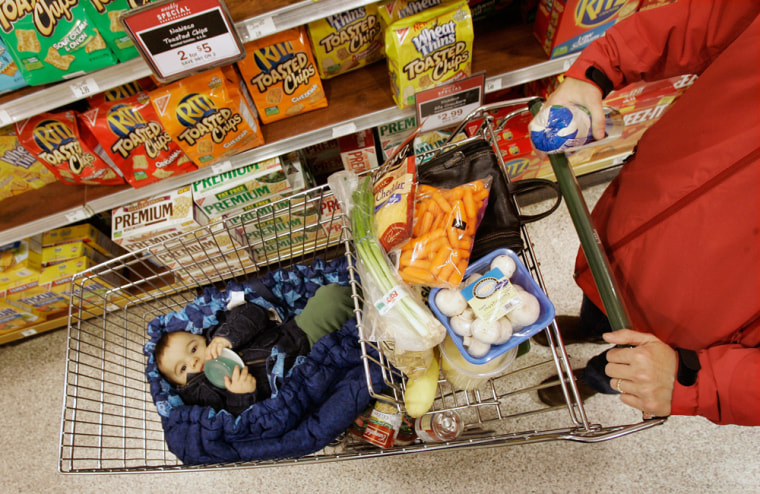The current economic downturn began with a sharp drop in housing prices and has been exacerbated by seven straight months of job losses. But ask Americans what worries them most about the lousy economy, and they are most likely to mention the rising prices of necessities.
Carol Netzel, a retired elementary school teacher, says shrinking budgets make this feel like a recession although one hasn’t been officially declared.
“It doesn’t matter what the economists say,” said Netzel, 78, of Coulee Dam, Wash. “All the people I chat with at the grocery store, the gas station, shopping for school clothes, all are feeling very depressed because of the beating their budgets are taking.”
Economists, led by top policymakers including Federal Reserve Chairman Ben Bernanke, are of two minds on the issue.
On the one hand, they acknowledge that rising inflation is becoming a greater threat to the economy. But with the gross domestic product growing at a snail’s pace, policymakers are reluctant to take any steps to slow inflation, because that might just tip the economy into a deeper downturn.
That is why central bankers left interest rates unchanged when they met Tuesday, declaring in a statement that “the inflation outlook remains highly uncertain” but that “downside risks to growth remain.”
Prices outpace paychecks
While economists are divided about the twin risks facing the economy, consumers are facing skyrocketing prices at the gas station and in just about every aisle of the grocery store. Prices of fruits and vegetables have shot up by 7.6 percent over the past year, while dairy products have jumped 9.2 percent and cereal 10.4 percent.
A recent study by the Pew Research Center found that inflation is by far consumers’ greatest concern about the economy. Forty-five percent of the public, compared to 24 percent in February, say rising prices are the biggest economic problem. Almost two-thirds say their incomes are lagging behind their living costs.
Although the federal minimum wage was raised by 70 cents to $6.55 an hour in mid-July, for many workers the increase already has been eaten up by higher gas and food prices.
Not being able to, or barely being able to, cover the cost of the basics is only validating the gloomy perception of many that the nation's economy already is in a recession. Msnbc.com readers say they’re forgoing vacations, struggling to fill their gas tanks for the drive to work and toggling between necessities at the grocery store.
Edward Maxwell, a social worker from Englewood, N.J.; says that between monthly payments on his home and high costs for everyday items, his paycheck isn’t stretching far enough anymore.
“The price of food is going through the roof,” he said. “The only thing that is staying the same is my salary.”
Keeping up with climbing costs is getting harder as paychecks barely budge. The Commerce Department reported on Monday that incomes edged up just 0.1 percent in June. Meanwhile inflation rose 0.8 percent, according to a measure tied to consumer spending — the second-largest jump since 1981.
‘A serious cash flow issue’
Besides inflation, growing concerns about the difficult job market and plummeting home prices also contributed to the belief of 72 percent of the public that the country is already in a recession, according to the Pew study issued last week. Of those surveyed, 73 percent surveyed said good jobs are tough to snag, compared with 55 percent a year ago. More than 55 percent said they have seen home prices fall in their region over the past year, compared with 41 percent in a February survey.
Economists are still hashing out the state of the economy. Some indicators point downhill: The unemployment rate struck a four-year high, and home prices are still in a slump.
But the gross domestic product did grow, although slowly, at 1.9 percent last quarter. Not so in the last quarter of 2007, when the GDP turned negative. One widely accepted definition of recession is that the gross domestic product turns negative for at least two quarters in a row.
While gasoline stands out as the necessity consumers can least afford, more people say they are just struggling to put food on the table. About 68 percent surveyed in the Pew study said they scramble to cover the runaway cost of gasoline. And 38 percent say it is difficult to afford food, compared with 27 percent in February.
Kim Wargo, a saleswoman for pharmaceutical packaging, says she and her husband have good incomes but are cutting back due to “a serious cash flow issue.”
“Gas, food, utilities are at an all-time high with no dramatic increase in our pay scale,” said the 41-year-old from Pittsgrove, N.J. “We limit our dining out to one night per week, and grocery shopping has been limited to needed items.”
Despite the public’s pessimistic view on the economy, many believe that something can be done to rescue the country from the economic rut. Almost three-quarters surveyed in the Pew study said their greatest worry — raging inflation — is manageable. Can the federal government fix the overall economy? Just shy of 70 percent say yes.
The economy overarchs as the nation's biggest problem, according to the Pew study. Compared to 17 percent who worry most about the war in Iraq, more than 60 percent, up from 34 percent in January, said the economy is their chief concern.
